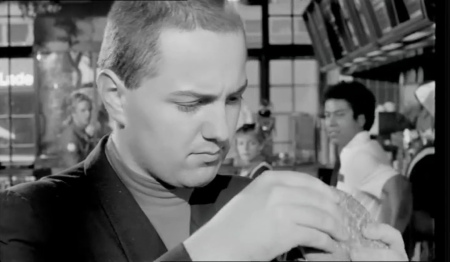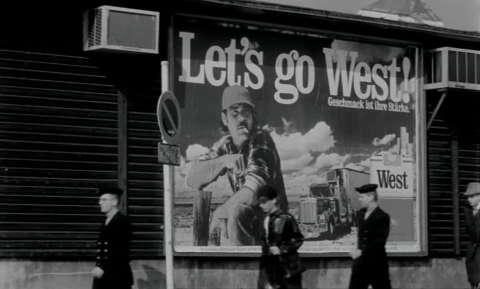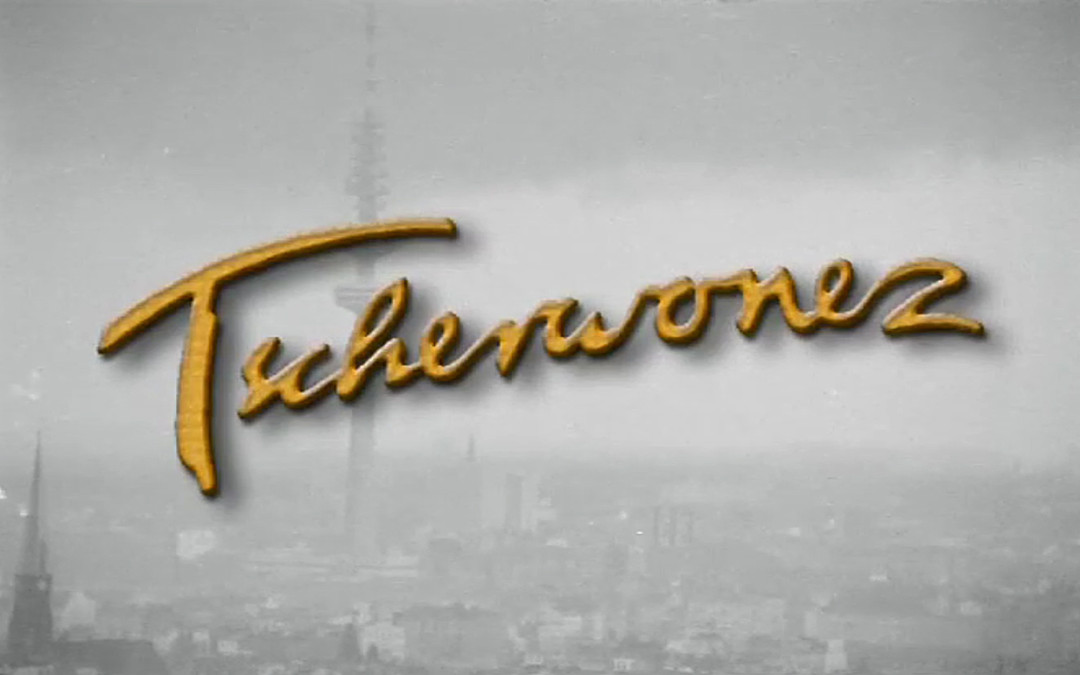*
*******
Trailer | German film Tscherwonez (1982)
Watch Tscherwonez in Entertainment | View More Videos at Veoh.com
*
Tscherwonez (1982)
by Fred Roberts
Music Editor
Imagine discovering an unknown film from 1982 with a soundtrack by Devo and the wit and cinematic prowess of Billy Wilder. It would be a sensation. That is what it means to find the German film Tscherwonez (1982), written and directed by the Hungarian director Gábor Altorjay and featuring the music of the Neue Deutsche Welle band The Wirtschaftswunder. At this point a small language lesson is in order. Tscherwonez (English: Chervonets) is the name of a gold coin issued in Russia and later in the Soviet Union and as such holds all the positive connotations a gold coin would normally hold, with some additional Eastern Slavic fascination. Wirtschaftswunder is the word for the economic miracle that occurred in post war West Germany, with the connotation that one should not look too far beyond the surface illusion of that success. Gábor is a member of Fluxus East who escaped to West Europe in 1967 after various repressions by authorities suspicious of his connections in the West.

Dmitrij at Burger King
The film centers on the Russian sailor Dmitrij (played by The Wirtschaftwunder’s guitarist Tom Dokoupil) and his odyssey through the pre-reunification capitalist society of West Germany. With his clean-shaven, cheerful face he is the picture of childlike innocence. On his first shore leave he decides to defect, taking with him his Chervonets, and setting out in search of his brother. He is pursued by a commando of his comrades who want to bring him back, and a savvy duo of agents from the “Department of Control,” an Orwellian Homeland Security, with orders to see what he is up to, but not to intervene. Dmitri encounters various manifestations of commerce and capitalism along the way, tests waiting to corrupt him. The dark underside of Germany’s past is not far behind, with an unrelated murder having been committed, Vietnamese asylum seekers, and manifestations of anti-foreign sentiment.
In what could be a reference to Eisenstein’s film Battleship Potemkin (1925), a collage of images establishes an idyllic existence on the Soviet ship where Dmitrij serves. Later on the captain sings a thoughtful song of life on the sea, accompanying himself on guitar, further solidifying this impression. When he learns of his sailor’s escape, he shows concern rather than anger. This is the haven where Dmitrij was safe, protected from systems like communism and capitalism. Away from the ship, in the real world, is where the temptations begin. As a foreboding of the approaching dangers Dmitrij, on shore leave, overhears a child at a kiosk wanting to buy candy:
Child: You used to get five for two.
Kiosk owner: Now it’s only two for five.
Child: You’re lying. I want five! (pause) I want them all!

Let’s go West
We see the image of Dmitrij and his comrades marching past a billboard with the message “Let’s go West!” – a German brand of cigarette. They stop to eat Double Whoppers at Burger King, splurging on ketchup, which must have been scarce under communism. In the restroom, where Dmitrij clandestinely changes into civvies for his escape, we notice an addict shooting up and fatally overdosing, a contrast to the child we saw minutes before, and a statement of one fate in a consumerist society. It’s the beginning and end of a process that finally consumes the individual.
The most striking scenes of the film were shot at the Bar at the Second Astral Plane, of the floor show. Angelo Galizia, lead singer of The Wirtschaftswunder, gives an expressive performance of E’Succeso in Kabul. The Italian language text (thank heaven for subtitles!) is like the reading of an Oracle, predicting all the trials that Dmitrij will face, and warning him to look out for himself. Angelo is followed by Olivia (Sheryl Sutton), the brother’s former girlfriend, in the brazen delivery of a song, a twisted bastardization of the U.S. Marines’ Hymn re-imagined as Girls from the Navy, the accompaniment sounding like an unholy church organ. Behind her is what might be a symbol of capitalism or the extreme decadence of modern society, or any number of interpretations, a lady wrapped above in an American flag and below in a Soviet flag, revealing upon its removal male genitalia. This is one of the most grotesque, nightmarish scenes ever filmed.
The music of the soundtrack is so closely intertwined with the feel of the film, and in some cases so essential to the story, it is difficult to decide which came first. I was able to contact The Wirthschaftswunder’s drummer Jürgen Beuth to ask how the soundtrack was created. His answer: “It was all very free and relaxed. At most we had a few mood descriptions: what kind of a mood, e.g. a chase, in the bar etc. We had complete freedom, and just played without thinking much.”
In my opinion, the result shows that it was a very good collaboration. As for the music of The Wirtschaftswunder: it’s experimental, sometimes anarchistic, with impassioned vocals by Angelo singing German with a thick Italian accent, and occasionally in Italian. The band had an early hit Der Kommissar and was on the verge of great success at the beginning of the NDW movement, but experienced some unfortunate setbacks, an automobile accident, and a lawsuit from their old label, after they signed to Deutsche Grammophon. This overshadowed the release of their second album and delayed the release of their next album until 1984, by which time the NDW era was coming to a close.
The intriguing thing about Gábor’s portrayal of the various persons is that there are no stock characters, no real villains. The spies from the Department of Control are not evil but more concerned about the overtime they’ve had to do. They are down to earth, normal people. Gábor achieves a snapshot of a system as well as the individual stories within it. There is also an adroit variation in the style of occurrences. Some are understated, others are overpowering, as needed to advance the story, which is surprisingly timeless, a message that hasn’t dated thirty odd years later.
One of the subtler sequences: Dmitrij’s comrades, as they come across the Bismarck monument state matter-of-factly: “They have a statue of Lenin too.” The scenes of Hamburg manage to convey the city’s charm. By focusing on landmarks which enjoy a certain constancy: Landungsbrücken, TV Tower, the Harbor, Bismarck, the Bunker at Feldstrasse… the film looks as if it might have been made a few years ago, except that the Burger King recently closed. It’s now a Starbucks. There’s something of a Billy Wilder meets Werner Fassbinder in Gábor’s style, but also a distinct voice. All in all this film is real, and a joy to watch again and again. For now it’s a lost classic with cult status, but it must be made available to a larger audience.
*
*
Related Links:
http://www.fluxus-east.eu/?item=exhib&sub=altorjay&lang=en (Gabor Altorjay bio)
https://www.youtube.com/watch?v=n_IuUlC-I00 (Live video of The Wirtschaftswunder, not from the film)
https://www.youtube.com/watch?v=c7mAP0w_LV8 (Song “É Successo In Kabul” from soundtrack, but no video)


Acknowledgement and thank you to Felix Kubin for sharing the film with me, without which this review wouldn’t have been possible.